Fotoğraf: Mario Hanousek for GEN
Global Editörler Ağı (GEN) bünyesinde 2012 yılından beri düzenlenen Veri Gazeteciliği Ödülleri (Data Journalism AWARD) akşam sahiplerini buldu. Viyana GEN Summit’in son gününde düzenlenen seremoniyle dünya genelinde 10 kategoride aday gösterilen veri gazeteciliği çalışmaları ödüllendirildi. Araştırmacı gazetecilik, veri görselleştirme, açık veri, haber veri uygulaması, yılın veri gazeteciliği sitesi kategorilerinin bulunduğu ödüllerde finalistler aynı zamanda jüri özel ödülü ve halkın seçimi ödülü olarak 2 kategoride de değerlendirildi.
Viyana
16 Haziran 2016
“Yılın araştırmacı gazetecilik ödülü: Panama Belgeleri”
Büyük haber merkezleri için yılın araştırmacı gazetecilik ödülünü Panama Belgeleri kazandı. Wikileaks’den beri en büyük veri sızıntısını olarak kabul edilen Panama Belgeleri, Panama menşeili Mossack Fonseca adlı kurum tarafından 214 binden çok off-shore kurum için düzenlenmiş olan 11.5 milyon gizli belgenin, 2.6 terabayt büyüklüğündeki, Almanya’nın Süddeutsche Zeitung gazetesine ve ABD merkezli International Consortium of Investigative Journalists kurumuna sızdırılmasıyla ortaya çıkmıştı.
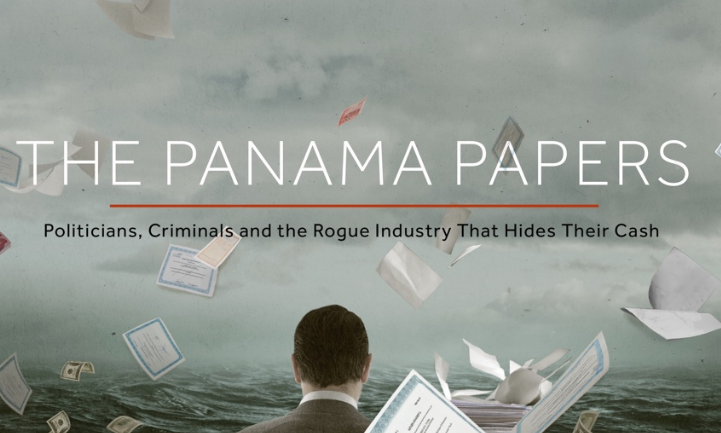
Sızdırılan belgelerde başta Rusya Devlet Başkanı Putin gibi bir çok sayıda ülkenin varlıklı kişileri ve siyasetçilerinin offshore hesapları ve bu hesaplarla bağı olan kişilerin dökümü yer alıyordu. Süddeutsche Zeitung ve International Consortium of Investigative Journalists’in yardımıyla sızdırılan veriler, Guardian, BBC gibi diğer haber kuruluşlarıyla paylaşılamış, global düzeyde bir çok haber kuruluşu ve 370 gazetecinin işbirliği sonucunda veri odaklı, dünya gündemini sarsan büyük çaplı bir araştırmacı gazetecilik örneğine şahit olmuştuk.
Küçük haber odaları için yılın araştırmacı gazetecilik ödülü: Medicamentalia.org
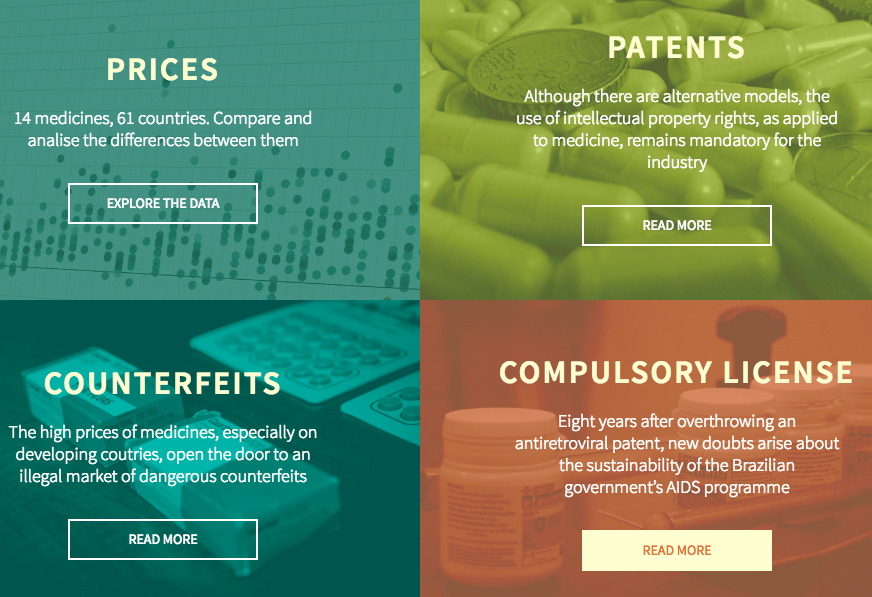
Küçük haber odaları için yılın araştırmacı gazetecilik kategorisinde ise İspanya merkezli Civio Vakfının Medicamentalia projesi aldı. Civio Vakfının bu çalışması aynı zamanda hem kitle kaynak hem de saha araştırması niteliği taşıyor. Medicamentalia projesi ile 14 yüksek profilli ilacın 64 ülkeye göre fiyat karşılaştırmaların yer aldığı projede ” Kongo’da yaşayan bir insan bir kutu Omoprozle maaşının 13 gününe karşılık gelirken İspanya, Almanya, İtalya gibi gelişmiş ülkelerde aynı ilaç bir veya iki saatlik çalışma ücretiyle satın alınabildiği dile getiriliyor. Projede aynı zamanda ilaç endüstrisinin şeffaf olmayışı vurgulanırken ilaç maliyetlerinin gelişmekte olan ülkelerde bu denli yüksek olmasının bu ilaçların sahtelerinin üretilmesine yol açtığı belirtiliyor.
“Five Thirty Eight Ödül Törenine Damgasını Vurdu”
Yılın veri gazeteciliği sitesi olarak seçilen ABD merkezli veri haberciliği sitesi Five Thirty Eight büyük haber merkezi için yılın haber uygulaması kategorisinde de ödüle layık görüldü. “What would it take to turn Red / Blue States Blue / Red” başlıklı haber uygulamasında 2016 sonbaharında gerçekleşecek ABD başkanlık seçimleri öncesi Amerikan halkının yaşadığı lokasyona, eğitim durumuna ve etnik yapısına göre değişen siyasi eğilimleri analiz ediliyor.
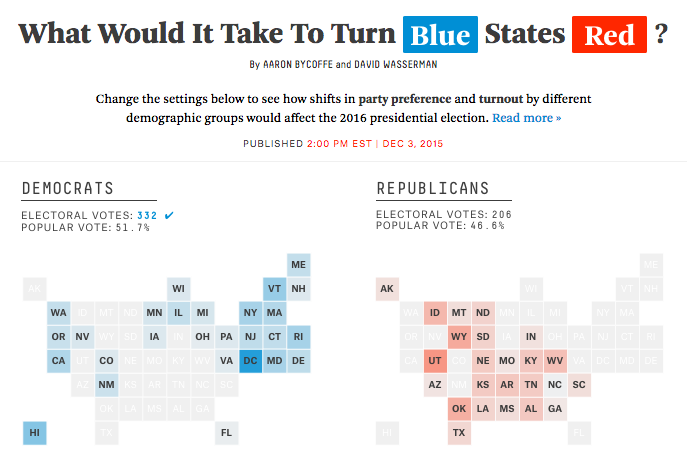
Projede özellikle Cumhuriyetçiler ve Demokratlar arasında sürecek olan başkanlık yarışını ABD’de hangi dinamiklerin etkileyebileceğine dair tespitler bulunurken, okuyucuya demografik verilerle oynama ve alternatif seçim sonuçlarına ulaşma imkanı sağlıyor.
Küçük haber odaları için haber uygulaması ödülü: Excesses unpunished
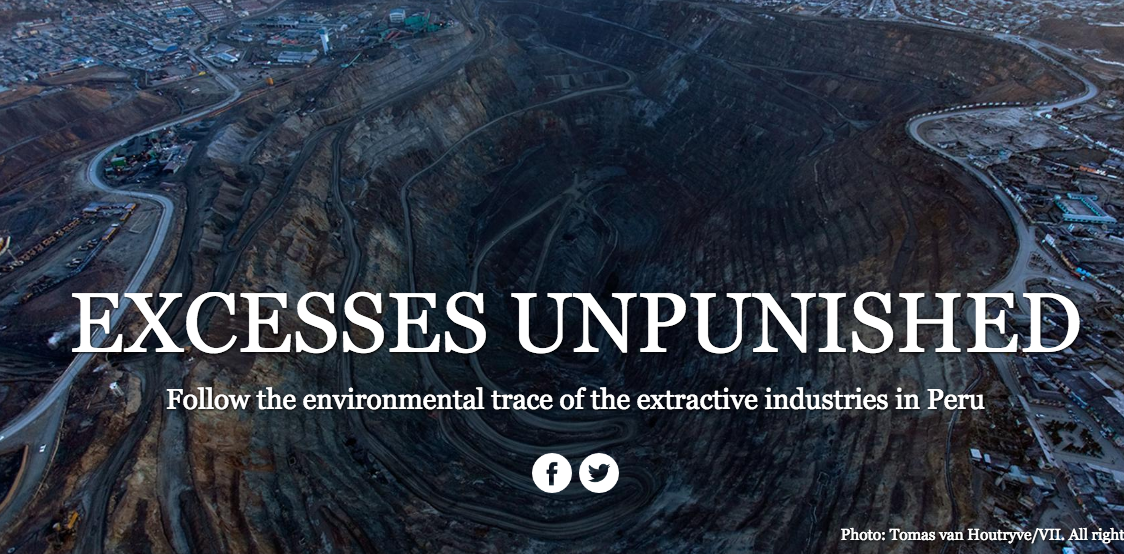
Küçük haber odaları için haber uygulaması kategorisinde ise Peru merkezli Convoca kuruluşunun Peru’da hükümet destekli olarak yapılan maden ve petrol arama faaliyetlerine yönelik “Excesses unpunished” veri tabanı projesi ödüle layık görüldü. Özellikle altın madeni çıkarımında dünyada 5. sırada yer alan Peru’da hem özel şirketleri hem de ekonomi maden sektörüne bağlı durumda. Devlet destekli olarak maden şirketlerinin çevreye zarar veren aktivitelerine odaklanan proje Peru’daki maden sektörü hakkında detaylı veriler içeriyor. Proje’de 80’den fazla kişiyle röportaj yapılmış ve birçok multimedya içerik kullanılmış.
“Yılın Veri Görselleştirme Ödülü: Buzzfeed”
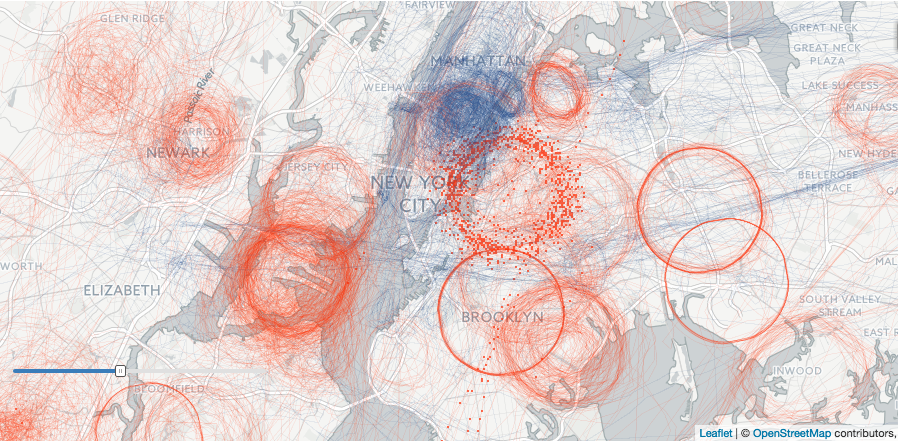
Veri görselleştirme kategorisinde yılın ödülü BuzzFeed’in FBI ve Milli Güvenlik (Homeland Security) kurumun gözetleme rotalarını analiz eden “Spies in The Skies” (Gökyüzündeki Casuslar) adlı çalışması aldı. Düzinelerce gigabaytlık verinin kullanıldığı projede FBI ve Homeland Security’nin Ağustos 2015 ve Aralık 2015 arası tarihlerde gözetleme rotaları Carto DB aracı kullanılarak görselleştirilmiş. Özellikle vatandaşların telefon konuşmalarını dahi dinlendiğinin belirtildiği projede FBI her ne kadar terörist ve suçluları izlediğini belirtse de gözetlemelerin hafta sonu %70 düştüğü ve daha çok Müslüman azınlığın yaşadığı bölgelerin izlendiği tespit ediliyor.
“Veri Gazeteciliği için Açık Veri”
Veri gazeteciliğinin gelişimi için devlet kurumlarının verilerini açması ve açık veri ekosisteminin varlığının kritik bir öneme sahip olduğu biliniyor. Bu yüzde Veri gazeteciliği ödüllerinde açık veri kategorisine de yer verilmiş. 2016 yılı açık veri dalında ödülü Open Data Journalism for Change (Değişim için açık veri gazeteciliği) projesiyle Arjantin’in köklü gazetecilerden La Nacion kazandı. Proje kapsamında La Nacion Data adında açık veri portalı oluşturularak devlet verilerini açık veri haline getirilmiş, ülkede bir nevi açık veri ekosistemi kurulmuş.

Bu projeyle de açık veriye ulaşım kolaylaştırılarak, medya sektörü ve gazeteciler veri gazeteciliği çalışmaları yapmaları, veri becerileri kazanmaları için teşvik ediliyor. Proje bununla da kalmıyor, özellikle devlet verilerine ulaşımda bazen zaman kaybına neden olan bilgi isteği (FOI) sürecini de ortadan kaldırıyor. Tabii ki böyle bir portalın kurulması kolay olmamış. La Nacion her yıl üzerine koyarak böyle bir portal / veri bölümü oluşturmuş, 6 üniversite ve sivil toplum kuruluşları ile iş birliği yapılmış, pdf’lere hapsedilmiş veriler, yapılandırılmış, işlenmiş veri haline getirilmiş.
Son dakika haberciliğinde veri kullanımı kategorisinde ödül: AL JAZEERA AMERICA (United States)
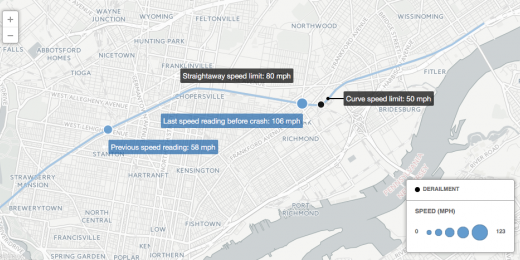
“On the evening of May 12, 2015, Amtrak 188 derailed outside Philadelphia, killing eight and injuring more than 200. Within hours, Al Jazeera America was reporting the exact speed of the train moments before it derailed: 106 miles per hour, more than twice the speed limit for that stretch of track. The next morning, Al Jazeera beat the competition again, publishing a graphic showing the exact path and speed of the train through that turn. Using a little-known dataset, the tiny Al Jazeera team was able to answer fundamental questions about the tragedy while the biggest newsrooms in the country were left to speculate. This is a superb example of data journalism in the service of breaking news.”
Yılın Onu Ödülü Kategorisi: #breathe, IndiaSpend, Hindistan
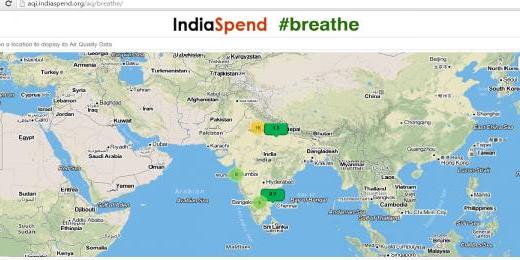
“This project uses low-cost, networked sensors to detect levels of invisible but deadly particles in the air. The short-term goal is to help individuals in the world’s second most-populous country cope with what the World Health Organization calls home to as many as 13 of the globe’s most polluted cities. Long-term, the goal is to mobilize efforts to reduce the pollution, which comes from sources ranging from forest fires to industrial plants. The data #breathe generates helps people decide what neighborhoods are safer, where to send their children to school, what time of day to leave home so as to reduce
Halkın Seçimi Ödülü: Peki Ya Suriye İç Savaşı Senin Ülkende Olsaydı…
Yukarıdaki kategoriler dışında veri gazeteciliği çalışmaları Halkın Seçimi ve Jüri Özel ödülü olarak iki kategori de daha değerlendirildi. Halkın Seçimi Ödülünü Public Radio Infomation‘ın “What If Syrian civil war happened in your country” adlı çalışması kazandı. Son yıllarda dünyanın başlıca sorunu haline gelen Suriye’deki iç savaş ve mülteci krizi üzerine yoğunlaşan çalışma, Suriye’de yaşanan savaşa okurun kendi açısından bakmasını sağlıyor.
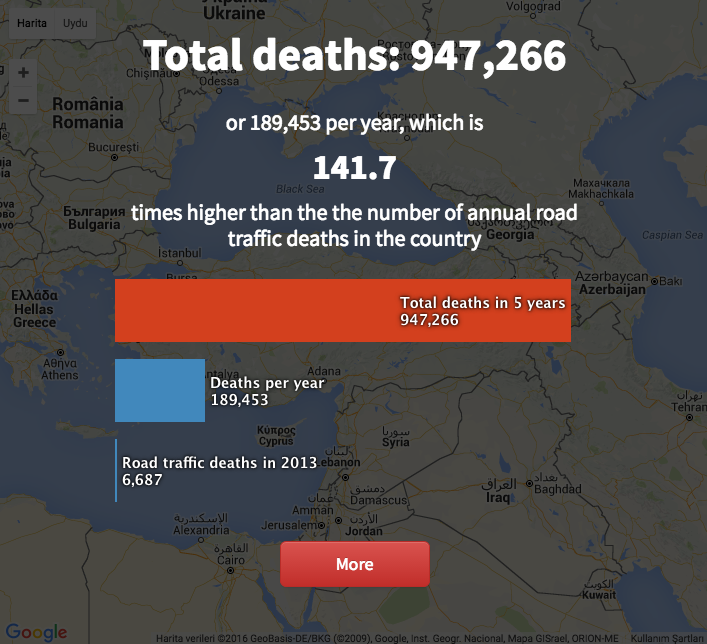
Çalışma ilk olarak ülkenizi seçmenizi istiyor, sonrasında eğer ülkenizde iç savaş yaşansaydı kaç kişi yaşamını yitireceğine dair simültane bir analiz sunuyor. Suriye İnsan Hakları Gözlemevi ve UN Cordination of Humanitarian Affairs verilerinin kullanıldığı çalışma, tüm ülkelerin 2010 yılı yıllık trafik kaza istatistikleri kullanılarak, iç savaş sonucunda meydana gelebilecek ölüm istatistikleriyle ile karşılaştırma imkanı da veriyor.
Ödül töreninde Jüri özel ödülünü ise Quartz adlı haber sitesi kazanırken, en iyi portfolyo katgorisinde ise ödülü Propublica veri gazetecisi Sisi Wei kazandı. Türkiye’den aday gösterilen iki çalışma vardı. Kategorilerinde herhangi bir ödül kazanmasalar da Dağ Medya yılın veri gazeteciliği sitesi kategorisinde, kadıncinayetleri.org çalışması ise küçük haber odaları için araştırmacı gazetecilik kategorisinde finalistler arasında yer aldı.
Çalışmalar hakkında daha detaylı bilgi edinmek için:
http://www.globaleditorsnetwork.org/programmes/data-journalism-awards/
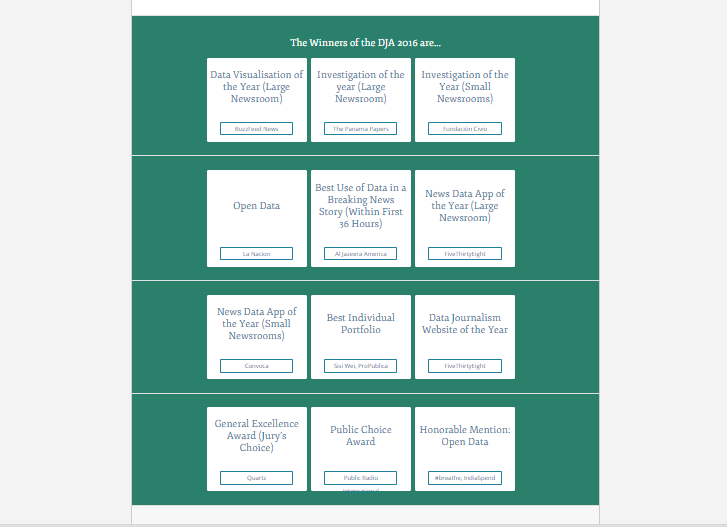
For English
|
Vienna,
16 June 2016
The winners of the Data Journalism Awards 2016 were announced at the DJA Awards Ceremony and Gala Dinner at Vienna’s City Hall, Austria on 16 June. The DJA Jury, presided over by Paul Steiger, selected 11 winners and one honourable mention (listed below) out of the 64 finalists.
The ceremony was held at the Ballsaal in the townhall, which provided a worthy ambience for the award. Amid over 400 invited guests the winners celebrated the success of their work.
“We are not a traditional media outlet, so this award is very very important to us” said Eva Belmonte from the Civio Foundation (Spain) who won the Investigation of the Year Award (Small Newsrooms) with their project Medicalmentalia.
“Data journalists don’t go for money, they don’t go for power, they go for energy and passion and they get prizes, thank you!” Corradini Luisa, French Correspondent at La Nacion (Argentina), representing her team who won the Open Data Award.
Over 2300 votes were cast in total for the DJA 2016 Public Choice Award this year. The winner in this category is “What if the Syrian civil war happened in your country?” by Public Radio International (USA).
The Data Visualisation of the Year (small newsroom) award was not attributed this year as the jury was unable to reach a majority choice in this category.
Each winner received an award of €1,000 and the honourable mention got a 500€ prize.
Now in its fifth year, the DJA competition is organised by the Global Editors Network and supported by the Google News Lab and the John S. and James L. Knight Foundation. It is today the international competition recognizing outstanding work in the field of data journalism. |
|
 |
| The Winners of the DJA 2016 Competition |
|
|
Here is the list of all the winners of the DJA 2016 competition. They make out the best of what the world of data journalism had to offer in the past year. Feedback for each category comes from President Paul Steiger on behalf of the whole DJA 2016 Jury.
|
|
|
Data Visualization of the Year (Large Newsrooms): Spies in the Skies, BuzzFeed News, USA.
“This is a fantastic example of the layers and depth that only visualization can bring to a story. In an elegant and mobile-friendly design, the story shows the surprising scope of the FBI’s and the Department of Homeland Security’s aerial surveillance using small, secretive aircraft. A series of maps displays cumulative tracks and a clever animation of all flights over time.”
|
|
|
|
Data Visualization of the Year (Small Newsrooms): No Award.
The jury was unable to reach a majority choice in this category and voted instead to make no award.
|
|
|
 |
|
Investigation of the Year (Large Newsrooms): The Panama Papers.
“This yearlong (and still continuing) global investigation involved more than 370 reporters in some 80 countries. The effort was triggered by the leak to Germany’s Sueddeutsche Zeitung of 11.5 million documents concerning 210,000 companies. The data flowed from clients of Panama-based Mossack Fonseca, a leading creator of offshore companies designed to hide financial activities of billionaires, sports figures, politicians, celebrities, and others.
Sueddeutsche Zeitung shared the data with the International Consortium of Investigative Journalists, which in turn brought in The Guardian, Le Monde, and more than 100 other media partners. Already, as a result, Iceland’s prime minister has resigned, Britain’s prime minister has released six years’ worth of tax returns to demonstrate his innocence of any possible misbehavior relating to his father’s secret financial activities, and Swiss police conducted two raids, including one on UEFA, the body that oversees professional soccer in Europe.” |
|
|
|
Investigation of the Year (Small Newsrooms):Medicalmentalia, the Civio Foundation, Spain.
“Medicamentalia is one of the best examples of a scalable, global data-journalism project. Its reach is far and execution masterful. This is a truly global vision implemented by a small team of journalists and data researchers. The back and forth between the numbers and the narrative allows the general public, as well as decision makers and other journalists to draw meaningful comparisons when it comes to the world of healthcare.”
|
|
|
|
News Data App of the Year (Large Newsroom); FiveThirtyEight with What Would It Take To Swing the Election?, USA.
“What makes news apps so powerful is that they give users the ability to engage directly with news and information, not merely absorb it. The result is a deeper appreciation for the nuanced facts and issues that are too often glossed over. That’s what makes FiveThirtyEight’s “What Would It Take To Swing the Election?” news app so compelling. It walks users through the role demographics plays in the U.S. presidential election and then hands them the keys to explore the phenomenon in greater depth. They soon see how a small shift in who votes could affect who wins the White House.”
|
|
|
|
News Data App of the Year (Small Newsrooms):Excesses Unpunished, Convoca, Peru.
“Great effort and original content in a news app that probes a serious environmental, political, and social conflict in Peru. It helps users to explore data that is not easily accessible to the general public about the country’s failure to control the environmental and other damage caused by its most crucial industry, mining. This news application both tells a compelling story and facilitates research that can support many more stories.”
|
|
|
|
Data Journalism Website of the Year:FiveThirtyEight, USA.
“As the concept and practices of data journalism mature, all major news organizations are adopting data-driven ways to inform readers. Over the past year, in this increasingly competitive environment, FiveThirtyEight stood out. The site produced statistically sophisticated articles on themes ranging from politics and racism to sports and crossword-puzzle scandals. Its data visualizations elegantly depict each story’s central message. And when its work came under fire, it had the courage to acknowledge the debate and occasionally concede the possibility of alternative views and even errors. There were many great data journalism sites last year but FiveThirtyEight led the pack.”
|
|
|
|
Best Individual Portfolio: Sisi Wei, ProPublica, USA.
“Sisi Wei has the dynamism of a modern data journalist: she is an investigative journalist; a designer; and a developer. As a News Applications Developer at ProPublica, Wei has an impressive portfolio that spans subjects from military reporting to U.S. higher education. Moreover, her leadership spills over from ProPublica to the field at large, with her tremendous work helping journalists learn to code through her organization “Code with Me” as well as her role at industry events including the data journalism conference held by the National Institute for Computer-Assisted Reporting (NICAR).”
|
|
|
|
Open Data: La Nacion, Argentina.
“In a country without a FOI Law and with a long culture of limited access to official records, La Nación Data has systematically and successfully pursued, for the last five years, the titanic mission of turning unstructured and hidden material into datasets accessible to everyone. La Nacion Data’s team not only built datasets from scratch, pushing the boundaries of access to information in Argentina, but they also reported extensively from the data and unfolded award winning investigative pieces.”
|
|
|
|
Honorable Mention: #breathe, IndiaSpend, India.
“This project uses low-cost, networked sensors to detect levels of invisible but deadly particles in the air. The short-term goal is to help individuals in the world’s second most-populous country cope with what the World Health Organization calls home to as many as 13 of the globe’s most polluted cities. Long-term, the goal is to mobilize efforts to reduce the pollution, which comes from sources ranging from forest fires to industrial plants. The data #breathe generates helps people decide what neighborhoods are safer, where to send their children to school, what time of day to leave home so as to reduce the toxic insults likely to fall deeply into their lungs.”
|
|
|
|
Best Use of Data in a Breaking News Story (Within First 36 Hours): Al Jazeera America withDerailed Amtrak train sped into deadly crash curve, USA.
“On the evening of May 12, 2015, Amtrak 188 derailed outside Philadelphia, killing eight and injuring more than 200. Within hours, Al Jazeera America was reporting the exact speed of the train moments before it derailed: 106 miles per hour, more than twice the speed limit for that stretch of track. The next morning, Al Jazeera beat the competition again, publishing a graphic showing the exact path and speed of the train through that turn. Using a little-known dataset, the tiny Al Jazeera team was able to answer fundamental questions about the tragedy while the biggest newsrooms in the country were left to speculate. This is a superb example of data journalism in the service of breaking news.”
|
|
|
|
Jury’s Choice: Quartz, USA.
“Throughout the jury’s debates, one site consistently cropped up: Quartz. Though the news site did not win any individual category, it performed to a high standard across multiple dimensions. The jury was particularly impressed by Atlas, an online tool the site launched last year that lets readers freely reuse previously published Quartz charts and data — or make their own charts. Thus, not only does the site inform readers, it helps readers to inform others. Quartz’s creativity and values enhance the goals of data-journalism; the jury is proud to honor it.”
|
|
|
|
DJA 2016 Public Choice Award: What if the Syrian civil war happened in your country?, USA
How do you generate empathy with the victims of a war that has been repeatedly told through various formats and media in the past 5 years? Despite being the most disastrous humanitarian situation in the 21st century, most of us have become numb to the Syrian civil war. Numbers and infographics highlighting the cruelty of the crisis no longer move us. In conjunction with the fifth anniversary of the Syrian civil war and the growing anti-refugee sentiment in the US and Europe, this news app uses basic data to allow users to simulate the civil war in their own country, moving the war closer to their hearts.
|
|
|
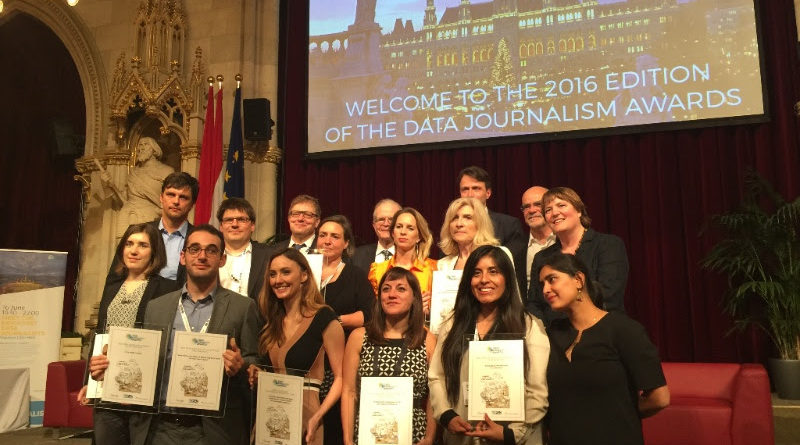
























Geri bildirim: 6 Ocak| Nişantaşı Üniversitesi Yeni Medya Bölümü Öğrencilerine Açık Veri Gazeteciliği Atölyesi – Açık Veri ve Veri Gazeteciliği
Geri bildirim: 21 Ocak| Gazetecilere Uygulamalı Açık/Veri Gazeteciliği Dersi – Açık Veri ve Veri Gazeteciliği